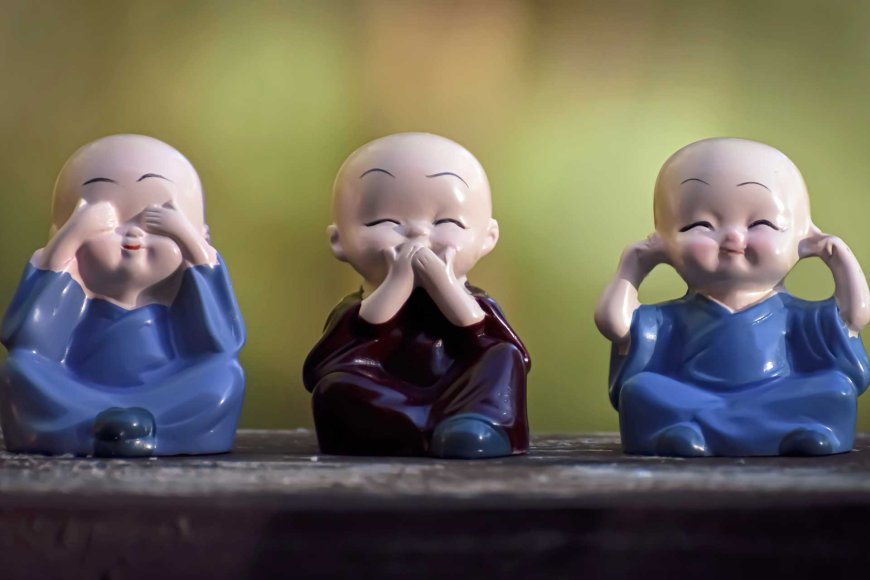Chiku Chiku Kotoba: The Sharp Words That Shape Relationships
Words have the power to heal or hurt, and in Japanese culture, the concept of 'Chiku Chiku Kotoba' warns us about the impact of sharp, critical language.

The Power of Words in Japanese Culture
In Japanese culture, words hold immense power. "Chiku Chiku Kotoba" (ちくちく言葉) literally translates to "prickly words" and refers to hurtful or critical language that can sting others emotionally. This concept serves as a reminder to be mindful of how we communicate, as words can build up or break down relationships, self-esteem, and overall harmony.

Chiku Chiku Kotoba's Roots in Japanese Society
The concept of "Chiku Chiku Kotoba" comes from a long-standing Japanese cultural emphasis on harmony and respect. In Japan, indirectness and avoiding conflict have traditionally been valued in order to preserve social unity. The idea of avoiding hurtful language is deeply rooted in Confucian and Buddhist principles that stress the importance of empathy, compassion, and emotional restraint. "Chiku Chiku Kotoba" serves as a warning, a way to highlight the harm that careless words can cause within society.

How Chiku Chiku Kotoba Impacts Mental Health
Though subtle, Chiku Chiku Kotoba can have lasting effects on mental health, especially among individuals sensitive to criticism. When used repeatedly, prickly words can damage self-esteem, foster anxiety, and even lead to depression. In workplaces or schools, frequent exposure to such words can result in decreased motivation and a decline in performance. Understanding the impact of Chiku Chiku Kotoba underscores the importance of promoting a supportive environment, where empathy and encouragement are prioritized over criticism and negativity.

Fuwa Fuwa Kotoba: Softening Language to Promote Positivity
As an antidote to Chiku Chiku Kotoba, the concept of "Fuwa Fuwa Kotoba" (fluffy words) emphasizes the use of kind, supportive, and understanding language. This approach encourages people to be aware of their words and how they can affect others. Practicing Fuwa Fuwa Kotoba can enhance social bonds, improve mental well-being, and foster a positive atmosphere. For instance, complimenting someone’s effort instead of highlighting their mistakes can go a long way in creating a nurturing environment.

Chiku Chiku Kotoba in Relationships: The Invisible Dagger
In personal relationships, Chiku Chiku Kotoba can subtly erode trust and intimacy. Constant critical remarks, whether about appearance, habits, or behavior, can make a partner or friend feel unappreciated or misunderstood. To maintain healthy relationships, it’s essential to use Fuwa Fuwa Kotoba, focusing on open, honest, and considerate communication. This shift not only prevents hurt but also nurtures the bond by showing care and respect.

Teaching Children to Avoid Chiku Chiku Kotoba
Children are highly impressionable and often learn communication styles from the adults around them. Teaching them about Chiku Chiku Kotoba is essential for cultivating empathy and respect from an early age. Schools and families in Japan increasingly use role-playing and storytelling to help children recognize the effects of prickly words and encourage positive communication. By instilling these values early, we can create a more compassionate future generation.

Chiku Chiku Kotoba in the Workplace: Reducing Tension Through Communication
The workplace is another environment where Chiku Chiku Kotoba can create tension, reduce morale, and impede productivity. Managers and employees can benefit from training that emphasizes constructive feedback and open communication without using harmful language. Introducing Fuwa Fuwa Kotoba into daily interactions can foster a collaborative atmosphere, where team members feel valued and motivated.

Combating Chiku Chiku Kotoba in Digital Spaces
In today’s digital world, Chiku Chiku Kotoba has found new territory: social media. Anonymity can often embolden people to make harsh or critical comments without considering the consequences. Online communities in Japan and worldwide are increasingly focusing on combating negativity by promoting digital etiquette, kindness, and empathy. Campaigns to replace Chiku Chiku Kotoba with positive, constructive comments can create healthier, more uplifting digital spaces.

Adopting a Mindful Approach to Language
Mindfulness in communication means being aware of our words and how they may be perceived. Reflecting on whether our language might come across as prickly or supportive is key to practicing Fuwa Fuwa Kotoba over Chiku Chiku Kotoba. This mindfulness not only benefits others but also enriches our own lives, as we become more intentional in building meaningful connections with those around us.

Moving Beyond Chiku Chiku Kotoba for a Harmonious Society
The concept of Chiku Chiku Kotoba sheds light on the power of words and their role in human connection. By understanding its impact and actively promoting kinder communication through Fuwa Fuwa Kotoba, we can create a more harmonious, empathetic society. Whether in families, workplaces, or online spaces, small changes in how we speak can have profound effects on everyone’s well-being.
Examples of Chiku Chiku Kotoba
Scenario 1: Workplace Criticism
English:
"You’re always so slow at finishing your tasks. Can’t you be more efficient like your coworkers?"
Japanese:
「あなたはいつも作業が遅いですね。他の同僚みたいにもっと効率的にできませんか?」
(Anata wa itsumo sagyō ga osoi desu ne. Hoka no dōryō mitai ni motto kōritsuteki ni dekimasen ka?)
Scenario 2: Family Remarks
English:
"You’re still not married at your age? Your younger siblings have already started families!"
Japanese:
「その年でまだ結婚していないの?弟や妹たちはもう家族を持っているのに。」
(Sono toshi de mada kekkon shite inai no? Otōto ya imōto-tachi wa mō kazoku o motte iru noni.)
Scenario 3: School Bullying
English:
"Why do you always wear the same clothes? Don’t you have anything better to wear?"
Japanese:
「なんでいつも同じ服を着ているの?もっとマシな服を持っていないの?」
(Nande itsumo onaji fuku o kite iru no? Motto mashi na fuku o motte inai no?)
Scenario 4: Social Gathering Comments
English:
"You’ve gained so much weight! Do you even look at yourself in the mirror?"
Japanese:
「すごく太ったね!鏡を見たことある?」
(Sugoku futotta ne! Kagami o mita koto aru?)
Scenario 5: Romantic Relationship Criticism
English:
"Why can’t you ever plan something nice for us? You’re so thoughtless!"
Japanese:
「どうしていつも何も計画してくれないの?全然気が利かないね!」
(Dōshite itsumo nanimo keikaku shite kurenai no? Zenzen ki ga kikanai ne!)
These examples illustrate how Chiku Chiku Kotoba can unintentionally hurt others, emphasizing the need for more mindful communication.
Find Cheap Flight Tickets to any Destinations in Japan and the Philippines
Nipino.com is committed to providing you with accurate and genuine content. Let us know your opinion by clicking HERE.





























































